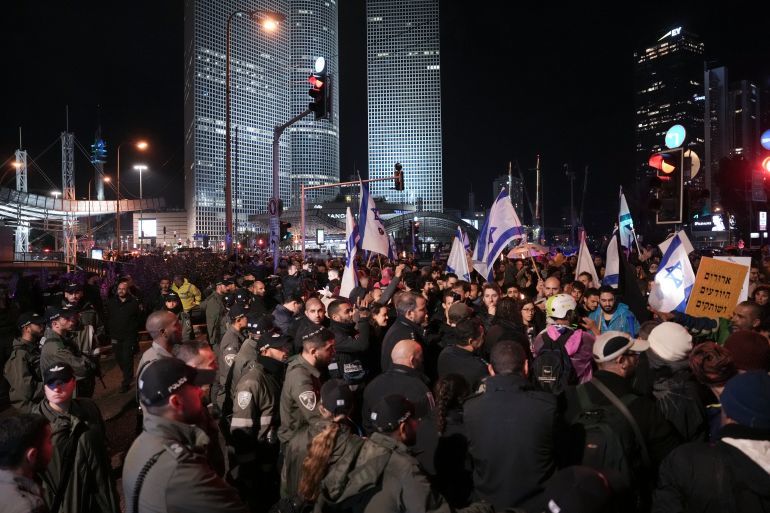
Netanyahu defiant despite protests against Israel judicial reform
Israeli Prime Minister Benjamin Netanyahu says his government plans to charge ahead with a proposal to change the country’s judicial system, despite fierce criticism from top legal officials.
Netanyahu, who is on trial for corruption, has made the legal changes the centrepiece of his new government’s agenda and the surging opposition to them is presenting an early challenge for the Israeli leader.
Netanyahu’s comments on Sunday came after opponents of the plan held nationwide protests on Saturday.
They say it would cripple judicial independence, foster corruption, set back minority rights and deprive Israel’s courts of credibility that helps fend off war crimes charges abroad.
The proposed changes have sparked an outcry from the Supreme Court’s top justice, who in rare public criticism called the proposed changes an “unbridled attack on the justice system”.
The country’s attorney general has also spoken out against the plan, as have many of her predecessors.
 Israeli police officers prevent protesters from blocking a highway
during a rally against the government’s plans to change the country’s
legal system, in Tel Aviv, Israel, January 14, 2023
Israeli police officers prevent protesters from blocking a highway
during a rally against the government’s plans to change the country’s
legal system, in Tel Aviv, Israel, January 14, 2023 “We will complete legislating the reforms in a way that will correct what needs correcting, will totally protect individual rights and will restore the public’s faith in the justice system that so much requires this reform,” Netanyahu said.
There have been calls in the past to reform Israel’s justice system, which was given greater clout in the 1990s and has been seen since by critics as being too interventionist in the process of lawmaking.
But the sweeping changes sought by Netanyahu’s justice minister have raised the alarm among opponents who see them as a death knell to Israel’s system of checks and balances and in turn, its democracy.
Netanyahu and his allies see the changes as a way to ease the process of governance and recalibrate what they say is an imbalance between the country’s executive and judicial branches.
Critics say the changes could help Netanyahu evade conviction in his corruption trial, or make the trial disappear altogether. Netanyahu denies any wrongdoing.
‘Profound disagreement’
Netanyahu heads a government of ultranationalist and ultra-Orthodox parties who at times in the past have seen their agendas thwarted by Supreme Court decisions or unfavourable counsel by government legal advisers.
That prompted them to make sure the legal changes were a top priority during negotiations to form the government. Netanyahu, eager to return to power under the shadow of his corruption trial, appeared inclined to be generous to his partners in the talks.
Among those concessions was a promise to make Avi Maoz, head of a small religious ultranationalist party who has repeatedly spouted anti-LGBTQ rhetoric, in charge of certain educational programs. The Cabinet approved the pledge on Sunday, despite an outcry from mayors and Israeli parents when it was initially discussed.
Meanwhile, Israel’s president warned on Sunday that the country faced a “historic constitutional crisis” over the contested judicial reform plan, and said he was mediating between the relevant parties.
“We are in the grips of a profound disagreement that is tearing our nation apart. This conflict worries me deeply, as it worries many across Israel and the [Jewish] Diaspora,” President Isaac Herzog said in a statement.
Herzog, whose post lacks executive powers and is designed to unify an often fractious Israeli society, said he was “working full time, by every means, making nonstop efforts with the relevant parties, with the aim of creating wide-reaching, attentive, and respectful discussion and dialogue”.











